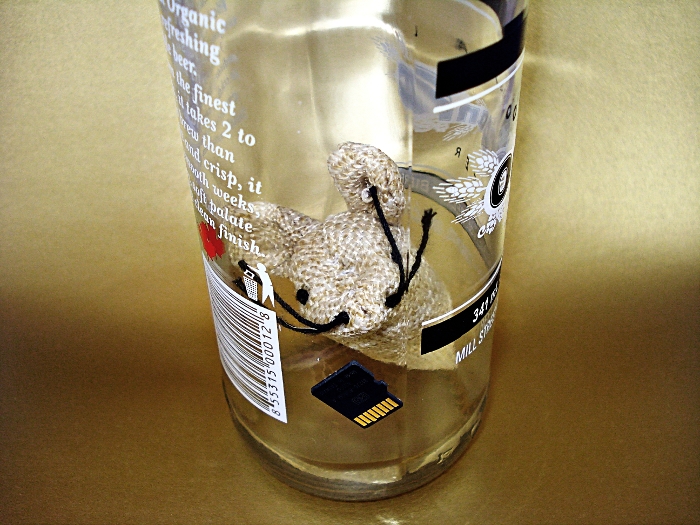"It's one of those things about living alone," Hank told his sister. "When you live with other people, if you find something not the way you left it, even if it's in your own bedroom or whatever, you figure someone else must have done it. When you live alone and that happens, you have to figure either you're forgetful or crazy."
The sister still lived at home, ostensibly to help out their ailing mother, but really because she could never be bothered to get her own place. So she nodded and asked what Hank thought the rain they'd got lately would do to this year's apple harvest. Hank always wanted to talk about odd, sensitive things. She didn't think it was very manly of him.
He extended the visit long enough to finish his coffee, praise the brownies his sister had made for dessert (though it was like eating chocolate-flavoured erasers), and help do the dishes. Then he gave his sister a quick hug, kissed his mother on the cheek, promised he'd come back soon, and caught the bus to go home.
He unlocked his apartment door, and noticed the smell was back again. Nail polish remover, the industrial-strength, old-school acetone kind, with an overlay of rose-scented perfume. By the time he'd closed and locked the door behind him, it had disappeared.
Agatha screamed, just a little, when she caught sight of him. The clothes... she'd always figured him to be the ghost of a workman, maybe one who helped build the apartment block, but the clothes weren't right. Denim trousers like a farmer or a construction worker, but this time she got a good look at him in the front hall mirror. He'd been wearing tennis shoes. Denim and tennis shoes and a bomber jacket and a collared shirt, with a tie on this time. She'd have wondered if he were a tramp, especially so unshaven, but all the clothes looked new, and in good repair.
She shook her head and went back to the washroom. She had to finish re-varnishing her nails before she went to bed.
Hank toed his shoes off and flopped onto the couch. He stretched an arm out for the remote control, turned the TV set on, and scrolled through the list for his PVR. He smiled when he saw that the game had been recorded after all — the PVR's behaviour when he wasn't home to keep an eye on it could be erratic. He hit the "play" button and settled back to watch.
The screen showed a gloriously gaudy animation of the sports channel's logo, and the bright colours reflected on the surface of the coffee table. Something on the table flashed a reflection of its own. Hank frowned and eased himself to a semi-sitting position. He picked up the object and twirled it around in his fingers before tossing it back onto the table.
"I thought I'd got all of them," he grumbled out loud. Another bobby pin.
Agatha exhaled a distinctly unladylike stream of curses. She had just one more curler to fix, but she couldn't find another bobby pin anywhere. With all the rations and the war effort they were almost impossible to buy. She let the loose section of hair flop over her left eye while she left the washroom and went to check her desk drawer. Maybe she could make do with a paper clip or something.
She checked the coffee table for dust as she passed by it, and noticed a shadow out of place in the cranberry-glass candy dish her aunt Sarah had given her. She stepped closer and peered in.
"How did you get here?" Agatha snatched up the errant bobby pin and trotted back to the washroom to finish rolling her hair.
Hank groaned out loud as the opposing team scored. He shivered and glanced in the direction of the washroom door. Weird. It felt like there was a draught. He pulled the blanket his mother had crocheted off the back of the couch and wrapped it over himself.
The TV set was displaying ads, but Hank felt too lazy to fast forward through them. He glanced down the hall, wondering if he was too full to have a beer after all, when he saw a shadow pass over the mirror on the washroom medicine cabinet.
He threw off the blanket and tiptoed down the hall, but when he peered into the washroom, no-one was there. He checked the bedroom too, just in case someone had somehow slipped in there while he was getting up from the couch.
Nothing. Just the faintest whiff of rose-scented perfume.












